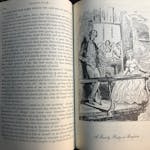"Shang-Chi and the Legend of the Ten Rings" arrived in theaters Sept. 3. If you think he's an odd addition to Marvel's line of superheroes, you'd be right. And therein, of course, lies a tale.
After decades of martial arts slowly infiltrating American pop culture, the 1970s saw the rise of the kung fu movie craze. It was enormously popular. And a star emerged: Bruce Lee. Then in 1972, ABC launched "Kung Fu," a hit TV series set in the Wild West, starring David Carradine. There were two very important viewers of this show, from a comics perspective: Jim Starlin (who created Thanos) and Steve Englehart (who wrote many a Marvel tale in the 1970s and '80s). Both were blown away, and Starlin began using "Kung Fu" philosophical concepts in his space odyssey, "Captain Marvel."
Later, both approached then-Marvel Editor-in-Chief Roy Thomas with a proposal for a martial arts-themed series. Thomas told them to include Fu Manchu — a "Yellow Peril" villain from the 1930s, to which Marvel had just attained the rights — and "Master of Kung Fu" was born. The series premiered in "Marvel Special Edition," a reprint title. It was an immediate hit, and retitled "Master of Kung Fu."
Englehart and Starlin gave us Shang-Chi, the son of Fu Manchu. He had been raised in a bubble learning martial arts and was ordered to perform an assassination for the good of the world as his first mission for dear old dad. But he soon realized his dad was a snake. Thus began Shang's new mission, joining MI6 in "games of deceit and death" to counter Fu Manchu. This combo plate of martial arts, Eastern philosophy and Western espionage was a huge hit.
In current comics, an effort has been made to incorporate Shang-Chi more into the Marvel Universe. He's been an Avenger, he's trained Spider-Man and his current series is a sort of revamped "Marvel Team-Up," with a different guest star in each issue.
One aspect of "MoKF" always grated on me, though: Fu Manchu. He was an ugly cliché, a racist stereotype in a series of novels. The xenophobia began in the late 1800s when many railroad workers were Chinese, and resulted in legislation like the Chinese Exclusion Act of 1882. Despite the title, the bigotry wasn't aimed at any one nation, but instead at Asians as a whole. Many of the Japanese-American adults who were rounded up and put in camps during World War II weren't citizens, despite living in the country for decades — because they weren't allowed to be. Not that it mattered. Their children, who were born Americans, were also locked up.
The "Yellow Peril" was in full evidence in comics. From the comic strip "Buck Rogers in the 25th Century" to the first issue of DC's "Detective Comics" (1937) featured an evil-looking Asian man on the cover, complete with Fu Manchu mustache.
As was the Mandarin, when he appeared in 1964. Which is one reason Fu Manchu hit me wrong. If Marvel wanted to use an ugly Asian stereotype for Shang-Chi's father, they already had one in the house: Mandarin. And since Marvel didn't own Fu Manchu, they would eventually lose the rights and set up the scenario now in play: Shang's father can no longer appear and can't be mentioned by name.
Which won't be a problem in the movies, where his father will be — as he should have been from the beginning — the entirely Marvel-owned Mandarin. And it's safe to say, those stereotypes are gone.






